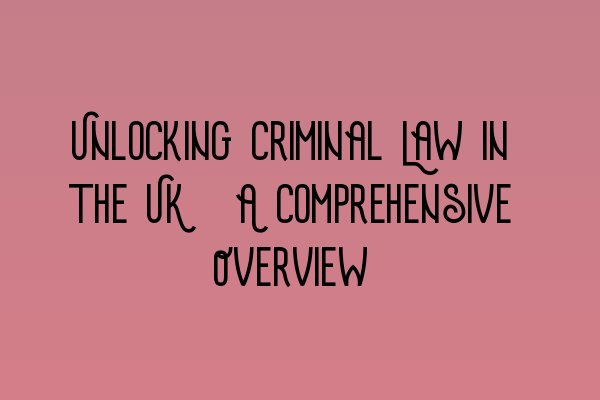Unlocking Criminal Law in the UK: A Comprehensive Overview
Welcome to SQE Criminal Law & Practice Law UK, your go-to resource for all things related to criminal law in the United Kingdom. In this comprehensive overview, we will delve into the intricacies of criminal law and guide you through the key concepts, processes, and challenges involved in this fascinating field. Whether you’re a law student, legal professional, or simply interested in the subject matter, this article is designed to unlock the mysteries of criminal law in the UK.
The Fundamentals of Criminal Law
Before we embark on our journey, it’s essential to understand the basics of criminal law. Criminal law is a branch of law that deals with offenses committed against the state or society, punishable by legal sanctions such as imprisonment, fines, or community service.
In the UK, criminal law is primarily governed by statutes, such as the Theft Act 1968, the Misuse of Drugs Act 1971, and the Criminal Justice Act 2003. These acts codify the various criminal offenses and their respective penalties.
However, criminal law is not limited to statutes alone. It also encompasses common law principles derived from judicial decisions and legal precedents. These common law principles play a vital role in shaping and interpreting criminal offenses.
Now, let’s dive into the essential elements of criminal law and explore its various components.
Criminal Offenses
There are several categories of criminal offenses, ranging from minor infractions to serious crimes. Some of the most common criminal offenses include:
- Assault: An intentional act causing fear of immediate physical harm or offensive contact
- Burglary: Unlawful entry into a building with the intent to commit a crime
- Drug Offenses: Possession, distribution, or trafficking of controlled substances
- Fraud: Obtaining property or monetary benefits through deceptive means
- Homicide: Unlawful killing of another person, which can be classified as murder or manslaughter
- Robbery: Taking someone’s property by force or threat of force
These are just a few examples of criminal offenses, and each offense has its own set of elements that must be proven beyond a reasonable doubt to secure a conviction in court.
Legal Procedure and Defenses
Once a criminal offense is committed, the legal process comes into play. This process involves the investigation, arrest, charging, trial, and potential sentencing of the accused.
The police typically conduct an investigation to gather evidence and identify suspects. If there is sufficient evidence, the suspect is arrested and brought before the court. The court then decides whether there is enough evidence to charge the individual with the alleged offense.
During the trial, the prosecution presents its case, aiming to prove the defendant’s guilt. On the other hand, the defense challenges the prosecution’s evidence and may present its own evidence and witnesses. The burden of proof rests with the prosecution, who must prove the defendant’s guilt beyond a reasonable doubt.
Defendants in criminal cases have various defenses at their disposal. These defenses include:
- Self-defense: Acting in self-defense to protect oneself or others
- Insanity: Lack of mental capacity at the time of the offense
- Duress: Being forced or threatened to commit a crime
- Mistaken identity: Claiming not to be the person who committed the offense
- Alibi: Providing evidence that the defendant was elsewhere during the time of the offense
These defenses play a crucial role in upholding the principle of “innocent until proven guilty” and ensuring a fair trial for the accused.
Penalties and Sentencing
Once a defendant is found guilty of a criminal offense, they may face various penalties and sentencing options. The severity of the offense and the defendant’s criminal history are factors that influence the sentencing decision.
Potential penalties may include fines, community service, probation, or imprisonment. In some cases, alternative sentencing options, such as diversion programs or rehabilitation, may be available.
It is worth noting that criminal law is constantly evolving, and new legislation can introduce changes to penalties and sentencing guidelines. Staying up-to-date with these changes is crucial for legal professionals practicing criminal law.
Conclusion
Understanding criminal law in the UK is vital for anyone interested in the legal system, law enforcement, or pursuing a career in law. This comprehensive overview has provided an insight into the fundamental concepts, offenses, legal procedures, defenses, and penalties associated with criminal law.
If you are preparing for the SQE exams or seeking further guidance, don’t hesitate to explore our practice exam questions or mock exams for SQE 1. Additionally, we offer SQE 2 preparation courses to help you excel in your legal studies.
Stay tuned to our blog for more informative articles on criminal law and other legal topics. If you have any questions or need legal assistance, feel free to get in touch with SQE Criminal Law & Practice Law UK. We are here to unlock the complexities of criminal law and guide you towards success.
